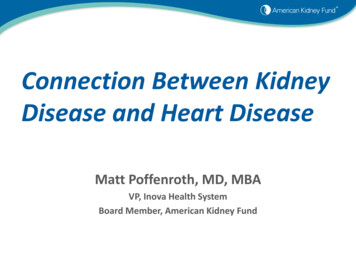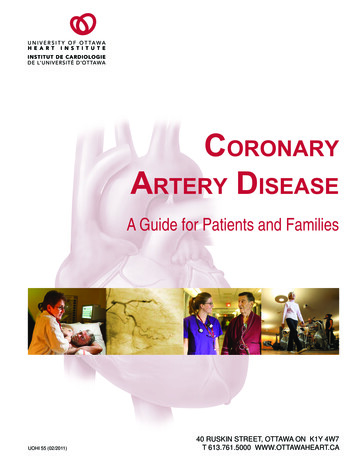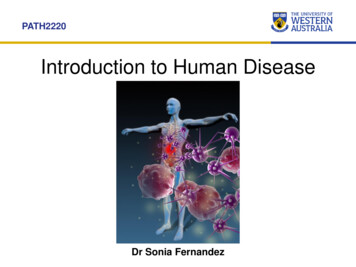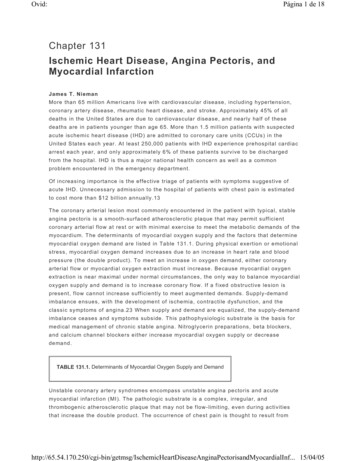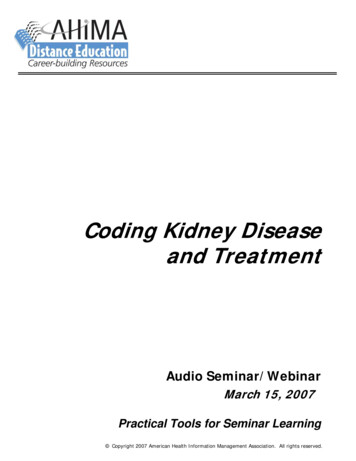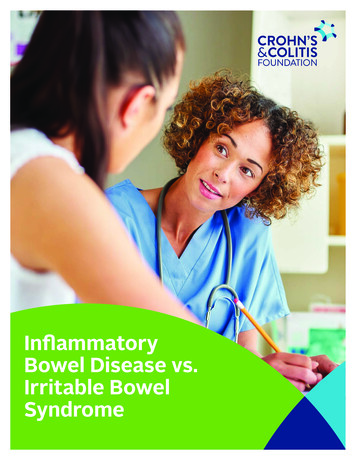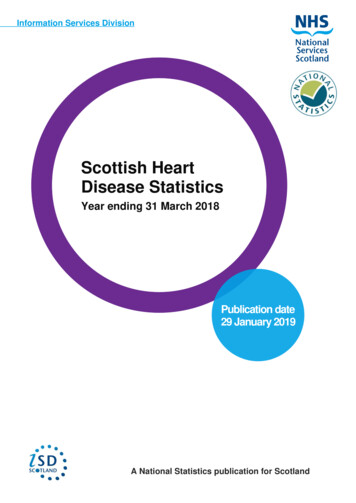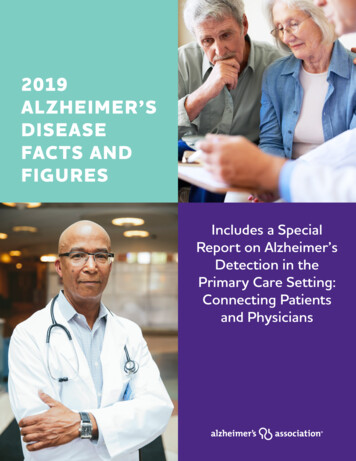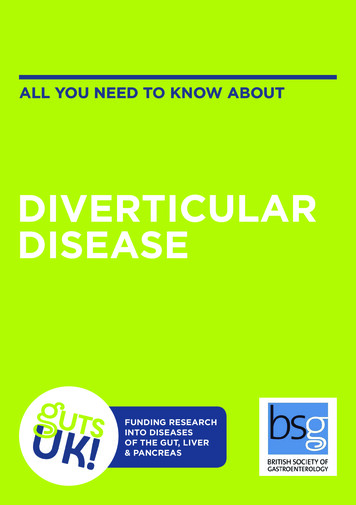
Transcription
ALL YOU NEED TO KNOW ABOUTDIVERTICULARDISEASEFUNDING RESEARCHINTO DISEASESOF THE GUT, LIVER & PANCREAS
THIS FACTSHEET IS ABOUTDIVERTICULAR DISEASEDiverticulum refers to a side-branch or pouch which sticks outwardsfrom the wall of the large intestine (also known as the colon). The mostcommon site for diverticula is in the lower part of the large bowel onthe left hand side, although they do occasionally occur in the smallintestine and, rarely, elsewhere in the gut. They are permanent unless theaffected part of the intestine is surgically removed. Diverticular disease isextremely common in the developed world. Between 30% and 50% of thispopulation will be affected during their lifetime with the likelihoodof developing it increasing with age.Diverticular disease is a term mainly used in people who developsymptoms. Diverticulitis means the condition that occurs when asingle diverticulum or several diverticula become inflamed.ContentsWHY DOES DIVERTICULAR DISEASE OCCUR?Page 3WHAT ARE THE CAUSES OF DIVERTICULAR DISEASE?Page 3WHAT ARE THE USUAL SYMPTOMS OF DIVERTICULAR DISEASE?Page 4HOW IS DIVERTICULAR DISEASE DIAGNOSED?Page 4HOW CAN DIVERTICULAR DISEASE AFFECT YOU?Page 5WHAT TREATMENT IS AVAILABLE FOR DIVERTICULAR DISEASE?Page 6HOW CAN DIVERTICULAR DISEASE AFFECT YOU OVER TIME?Page 7This leaflet was published by Guts UK charity in 2018 and will be reviewed in 2020. This leaflet was written under the direction of our Medical Director and hasbeen subject to both lay and professional review. All content provided is for information only. The information found is not a substitute for professional medicalcare by a qualified doctor or other health care professional. ALWAYS check with your doctor if you have any concerns about your condition or treatment. Thepublishers are not responsible or liable, directly or indirectly, for any form of damages whatsoever resulting from the use (or misuse) of information contained orimplied by the information in this booklet. Please contact Guts UK if you believe any information in this leaflet is in error.2
WHY DOES DIVERTICULAR DISEASE OCCUR?Imagine the large intestine as being similar to a bicycle tyre, with a soft,easily stretched inner tube and a tough outer tube. If a hole is made inthe outer tube, when the inner tube inflates, it squeezes out through thehole. Like the tyre, our intestine has a soft flexible lining surrounded by atougher outer tube of muscle. There may not be a hole in the outer tube assuch, but where there is a weakness in the muscle, the inner layer can pushthrough it to form the pouch that we call a diverticulum.LiverSpleenGallbladderStomachLarge IntestineSmall IntestineWHAT ARE THE CAUSES OF DIVERTICULAR DISEASE?The physical cause of diverticular disease is when stools become smalland hard rather than soft and bulky. These small stools pass through theintestine with difficulty and the intestine has to squeeze much harder thanusual to push them along. These contractions create high pressure withinthe intestine. If this happens regularly and over a long period of time thepressure eventually weakens the lining of the intestine, which may then bepushed through its outer wall, resulting in diverticular disease.The main reason why stools become small and hard is a lack of fibre inthe diet. Fibre is roughage, the part of our diet that we can’t digest and iswhat passes through us via stools. Therefore, the more fibre is consumed,the bulkier and softer the stools. A low fibre diet increases the chance ofgetting diverticular disease. Generally, we eat far less fibre in our highlyrefined Western diet than people who live in developing countries, wherediverticular disease is much less common.3
WHAT ARE THE USUAL SYMPTOMS OF DIVERTICULAR DISEASE?Around 75% of people who have the disease do not experience anysymptoms at all, so the disease is usually diagnosed incidentally duringinvestigation for another condition. The most common symptoms includelower abdominal pain, bloating (increase in abdominal size due to gas),change in bowel habit (diarrhoea or constipation) and mucus or blood inthe stool. The pattern of symptoms varies from one person to the next,but pain is often crampy, comes and goes (intermittent) and is commonlyfocussed in the left side of the abdomen where the diverticula most oftenoccur. Pain and bloating can often start after food is eaten and may easewhen a stool or wind is passed. Many people experience a change withdiarrhoea one day and constipation the next. It is important to rememberthat many symptoms of diverticular disease are very similar to those ofmore serious conditions such as bowel cancer so do not assume that theyare due solely to diverticular disease.When any of these symptoms occur, or if you experience a change insymptoms, tell your doctor who may suggest further investigations. It isnot clear why most people with diverticular disease remain well whilst aminority go on to suffer symptoms.HOW IS DIVERTICULAR DISEASE DIAGNOSED?Diagnosis is made by a careful examination of the interior of the colon.During the examination the doctor will be looking for other abnormalitiesthat could be causing the symptoms and so diagnosis is only confirmedonce other conditions have been ruled out. This can be done via: Colonoscopy: a tube with a camera is passed into the colon via the backpassage to view the inner surface of the colon. A sigmoidoscopy is asimilar procedure that views less of the colon. Medication can be given tomake the procedure comfortable and you will be given something beforethe procedure to ensure you completely empty your bowels. CT scan: this is a non-invasive x-ray-based test although, as with thecolonoscopy, you will be required to completely empty your bowelsbeforehand.4
HOW CAN DIVERTICULAR DISEASE AFFECT YOU?It is important to remember that most people with the disease will neverhave any complications. However, in some cases complications can occurand these include: Infection (diverticulitis): this is the most common complication,occurring in about 10%-25% of people with the condition. Thiscan happen when a piece of hard stool gets stuck in one or morediverticulum, forming an ideal environment for bacteria to multiply,leading to infection. Signs that this has happened include worseningabdominal pain, high temperature, nausea (feeling sick) or vomiting(being sick). If any of these symptoms are experienced medical helpshould be sought immediately. Diverticulitis is normally treated withantibiotics and a fluid only, or low residue diet, which will rest the boweland allow the inflammation to subside. Sometimes, when infection issevere, it can cause further complications such as a collection of pus(abscess), an obstruction (blockage of the bowel) or a perforation. Ifthese complications arise, an operation to remove part of the colon, or aneedle placed into the collection of pus may be needed. Blockage of the gut: scar tissue can sometimes form around the inflameddiverticulum. This may lead to narrowing of the colon, which can cause ablockage. Perforation in the diverticulum: sometimes an inflamed pouch(diverticulum) can burst, breaching the wall of the bowel and leading toperitonitis, a serious condition with widespread inflammation in the wholeof the abdomen. Large amounts of bleeding from the back passage: a blood vessel in thewall of a diverticulum can rupture leading to bleeding into the colon. Fistulas: rarely, the presence of diverticula may lead to formation ofabnormal connections (fistulas) between the gut and other organs suchas the bladder or vagina. Signs of this include small amounts of stool inthe urine or foul-smelling discharge from the vagina and, if diagnosed,surgery is usually necessary, so it is important to see a doctor if youhave these symptoms.5
WHAT TREATMENT IS AVAILABLE FOR DIVERTICULAR DISEASE?Self ManagementThe main treatment is to keep stools relatively soft and bulky. This mayreduce the likelihood of more diverticula developing and may reduce therisk of hard pellets of faeces lodging within the pouches. The best wayto do this is to eat more fruit and vegetables, nuts, wholemeal bread andpasta, wholegrain cereals and brown rice, which are all good sources offibre. The aim is to have at least one high fibre food with each meal, fiveportions of fruit or vegetables per day and try to drink at least two litres(eight to ten cups) of fluid every day.However, people with diverticular disease can respond differently to fibrein the diet and even to different types of fibre. So whilst one person maybe helped by increasing the amount of plant fibre in the diet, another mayfeel that their symptoms become worse. Some people find that it helpsto take fibre in the form of fruit and vegetables rather than that in cerealsand grains, which may cause more bloating and pain. Bran aggravatessymptoms for some people and so is not routinely recommended. Avoidinglarge or fatty portions of food is a common-sense measure if symptomsare worse after meals. Overall it is not possible to make specific rules aboutdiet and there is usually an element of trial and error for each individualuntil they find what suits them best.If you change the foods you eat it is important to ensure your dietremains balanced and nutritious. The NHS website has useful informationon what constitutes a healthy diet. It also contains the Eatwell Guide, avisual representation of which food groups you need to eat, and in whatproportions, to achieve a balanced diet. Visit the NHS website at:www.nhs.uk/live-well/eat-wellThe British Dietetic Association (BDA), the association of UK dietitians, alsohas information on healthy eating on their website. Visit their Food Factssection at:www.bda.uk.com/foodfactsYou can also request the Guts UK ‘Healthy eating and the digestive system’leaflet or download it from the Guts UK website.6
MedicinesThere is no specific medical treatment for the general symptomsof diverticular disease although supplements which contain fibre suchas ispaghula husk or methyl cellulose preparations will soften the stools.A pharmacist will be able to advise. Some doctors may prescribe anantispasmodic drug, but the results are often disappointing. An antibioticmay be tried if inflammation is suspected but painkillers such as codeineshould be avoided as they tend to worsen and can even cause constipation.SurgeryThis is usually only undertaken after an episode of inflammation becausean abscess has formed around the colon, or infection from the inflamedperforated diverticulum has spread more widely within the abdomen. Themost commonly performed operation cuts out the segment of the bowelwith the infected pockets. One end of the bowel is brought up to the skinas a stoma where the bowel content comes into the bag. This can later bereversed if the inflammation is not too severe and the bowel can be joinedback together.HOW CAN DIVERTICULAR DISEASE AFFECT YOU OVER TIME?Most people with the condition never get any symptoms at all and if theydo arise, they are not likely to be serious and can be well managed with asimple change of diet. Relatively few patients ever get complications severeenough for them to be admitted to hospital and very few people die of thisvery common disease.WHAT TO ASK YOUR DOCTOR? Has my colonoscopy/CT scan ruled out any other conditionsor are there any issues of potential concern in my colon? What dietary changes would help my condition? What monitoring or follow up will I be offered?For more information about research in this area pleasecontact Guts UK.gutscharity.org.uk 020 7486 0341 info@gutscharity.org.uk7
OUR DIGESTIVE SYSTEMMY NOTES8
Can you support Guts UK charity?Whatever you do already, do it forGuts UK charity. The more we allknow about our digestive system,the better we can look after it.Fancy making us a knitted gutsset for education purposes?Contact us for a patternIF YOU FIND THIS INFORMATION USEFUL,PLEASE SHARE IT WITH OTHERSfacebook.com/GutsCharityUK@GutsCharityUK
About Guts UKGuts UK’s vision is of a worldwhere digestive disorders arebetter understood, better treatedand everyone who lives with onegets the support they need.Our mission as Guts UK is to provide expert information,raise public awareness of digestive health and transformthe landscape for research into our digestive system to helppeople affected by diseases of the gut, liver and pancreas.WE ARE PASSIONATE ABOUT OUR GUTS.COME ON BOARD AND JOIN US.This charity was set up to change something –to increase the levels of research into diseasesof the gut, liver and pancreas so no one suffersin silence or alone. Since 1971 we have fundedalmost 300 projects and invested 14 million intomedical research that leads to better diagnosesand treatments for the millions of people who areaffected by digestive diseases and conditions.But we still have much more to do.Will you support Guts UK?Give a donation today and play your part in thenext vital research that will change things forfuture generations of people affected by thefrustration and misery of digestive disease.Together we can make more important changehappen. Vital answers, new treatments and hope.FIND OUT MOREvisit gutscharity.org.ukAt Guts UK we only want to send you information you want to receive, the way you want to receive it. We take great care of your personal data and never sell orswap data. Our privacy policy is online at www.gutscharity.org.uk and you can always change your preferences by contacting us at info@gutscharity.org.uk orcalling 0207 486 0341.
ORTURN OVER F MROFNDONATIO
You can donate by filling in the form below and sending it to FreepostRTJK-YYUL-XXSZ, Guts UK, London NW1 4LB , online at gutscharity.org.uk,by calling us on 020 7486 0341 or by texting GUTS18 and your donationamount to 70070DONATIONFORMDONATING IS EASY1Choose whether you want tomake a one-off donation, ormake regular donations.23Enter your detailsin the form below.Send this form, via Freepostto us or call us to take payment.YOUR DETAILSNameAddressPostcodeTelEmailMAKE A ONE- OFF DONATIONExpiryCard no/Sec codeAddress(if differentfrom above)to take my detailsPlease call me onI would like to support GUTS UK with a donation of 5 10 25 50 100 500OtherSUPPORT BY REGULAR GIVINGInstruct your Bank or Building Society to pay by Direct Debit. Please fill in the formin ballpoint pen and send to: Freepost RTJK-YYUL-XXSZ, Guts UK, London NW1 4LBGuts UK referenceName(s) of Account Holder(s)0001 /Bank/Building Society Accu No.Sort codeName and address of your Bank or Building societyBranch name:Address:Instruction to your Bank or Building SocietyPlease pay Guts UK Direct Debits from the account detailed inthis instruction subject to the safegaurds assured by the DirectDebit Guarantee.I understand that this instruction may remain with GUTS UK and,if so, details will be passed electronically to my Bank/BuildingSociety.Signature(s)DatePayment date (not 31st)AmountPostcode:Contact numberNote:Banks and Building Societies may not accept Direct Debitinstructions for some types of accounts.Please turn every 10 you donate into 12.50 - at no extra cost to you!I am happy for all gifts of money that I have made to Guts UK charity (Core) in the last four years and all future gifts of money that I maketo be Gift Aid donations. I am a UK taxpayer and understand that if I pay less Tax & Capital Gains Tax in that tax year than the amount ofGift Aid claimed on all my donations across all charities, it is my responsibility to pay any difference. Guts UK charity claims 25p forevery 1 you donate from the tax you pay for the current tax year. If your circumstances, name or address change, please do let us know.Add Gift AidSignature(s)DateWOULD YOU LIKE US TO STAY IN TOUCH?RECEIPT DETAILSBy postI require a receipt for this donationBy emailRegistered Charity: 1137029By telephone
the bulkier and softer the stools. A low fibre diet increases the chance of getting diverticular disease. Generally, we eat far less fibre in our highly refined Western diet than people who live in developing countries, where diverticular disease is much less common. 3 Liver Stomach Spleen Gallbladder Large Intestine Small Intestine


